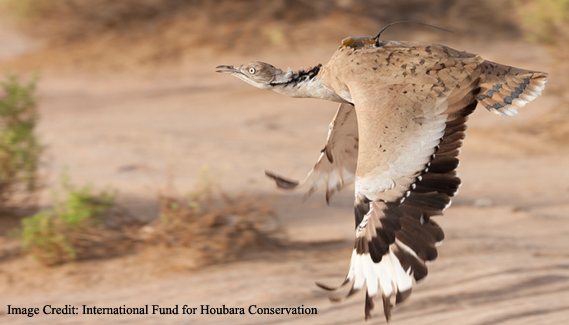ID :
327947
Thu, 05/08/2014 - 10:40
Auther :
Shortlink :
https://oananews.org//node/327947
The shortlink copeid
Two thousand captive-bred Asian Houbara released in Kazakhstan

Abu Dhabi (WAM): In implementation of the initiatives of President His Highness Sheikh Khalifa bin Zayed Al Nahyan, the International Fund for Houbara Conservation, IFHC, has released 2,000 captive-bred Asian Houbara in Kazakhstan, Central Asia, in the largest ever single release of the species in the wild.
Mohamed Saleh Al Baidani, Director-General of IFHC, said, "This is a very significant day in the history of Houbara conservation. Previously we have only carried out small-scale experimental releases in Kazakhstan in order to learn more about the migration and habits of the Houbara, but a release on this scale takes our efforts onto to a completely new level." The Houbara were flown by transport plane to Shymkent close to the Sheikh Khalifa Houbara Breeding Centre - Kazakhstan (SKHBC - KZ). Upon arrival, the birds were immediately taken to three release sites situated within designated protected zones in South (Kyzyl-Kum), Central (Betpak-Dala) and West (Mangystan) Kazakhstan. While all of the Houbara were tagged with identification rings, 93 of the birds were fitted with GPS satellite tracking devices (equally split across the three sites) with an additional 20 females fitted with VHF transmitters and released in Betpak-Dala.
The data from the tracking devices will provide vital data about migration and survival to supplement the world-leading Houbara ecology programme pioneered in Abu Dhabi.
Al Baidani added, "The expertise IFHC has built up over many years allowed us to undertake an operation of this magnitude. I would like to thank everyone involved; the staff of IFHC, officials and staff in Kazakhstan and our partners, Reneco, in making this such a huge success. Releasing birds on this scale will help to reduce the pressure on wild populations and, over time, build those populations to sustainable levels." The mass release of Houbara swiftly follows the signing of a Cooperation Agreement with Kazakhstan in January this year. That agreement set out arrangements for the operation of the Sheikh Khalifa Houbara Breeding Centre - Kazakhstan at Shayan. The centre is the fourth around the world managed as part of IFHC's international efforts to preserve the Houbara. The agreement also established arrangements for the development of protection zones and habitat preservation.
The range of the Asian Houbara stretches from Egypt in the west eastwards into Mongolia, but Kazakhstan is a strategically important country within the species range. It is estimated that the country is home to eighty per cent of the world's migratory Asian Houbara population. During their migration, the Houbara travel thousands of kilometres, and some arrive in the Arabian Peninsula to escape the very cold winter weather in Central Asia.
The strategic importance of the country is reflected in the long-standing relationship between the two countries. Field studies in Kazakhstan by ecologists from Abu Dhabi began in 1994 and in 2007 the decision was taken to build a permanent breeding centre. – Emirates News Agency, WAM





